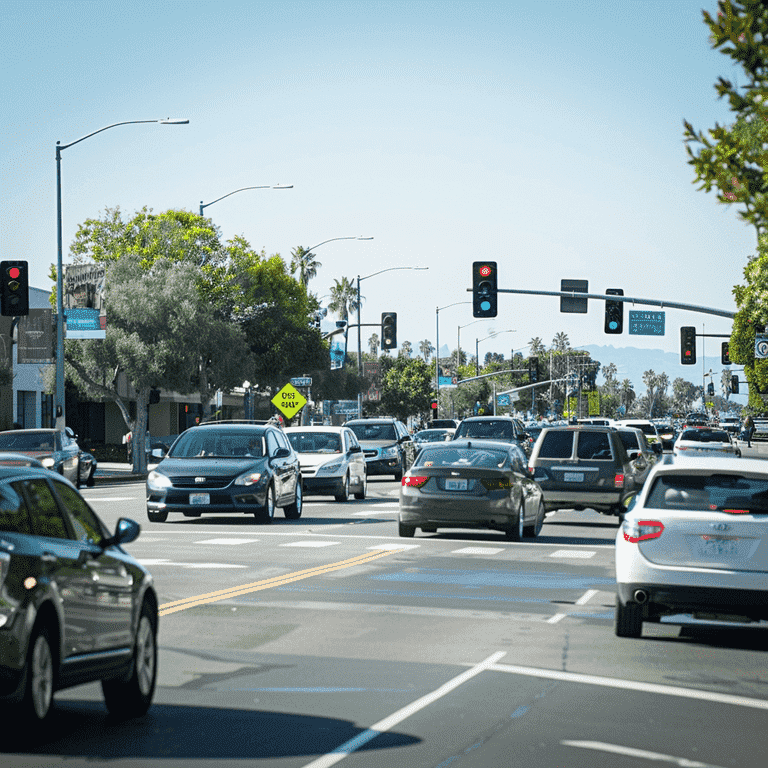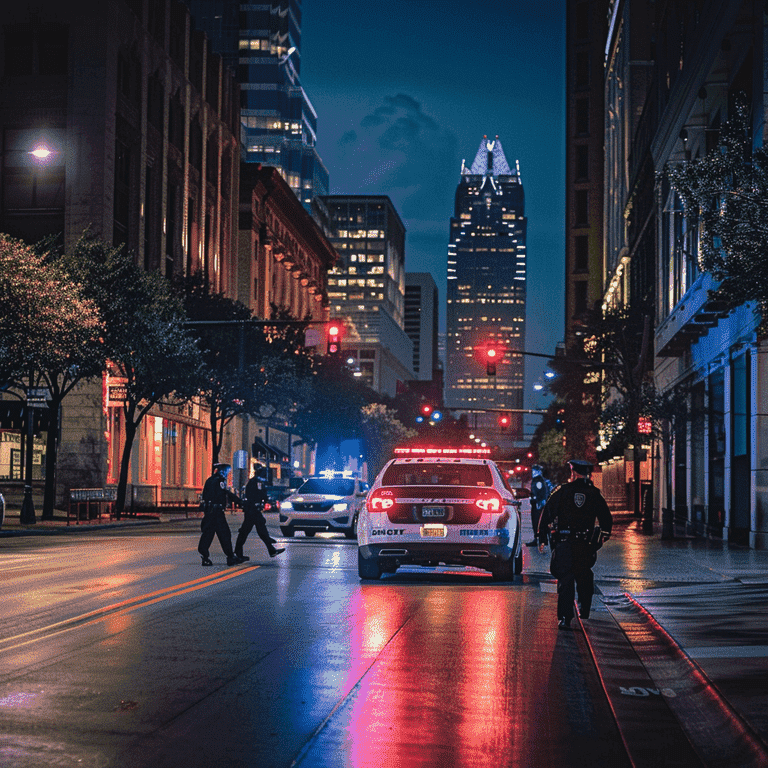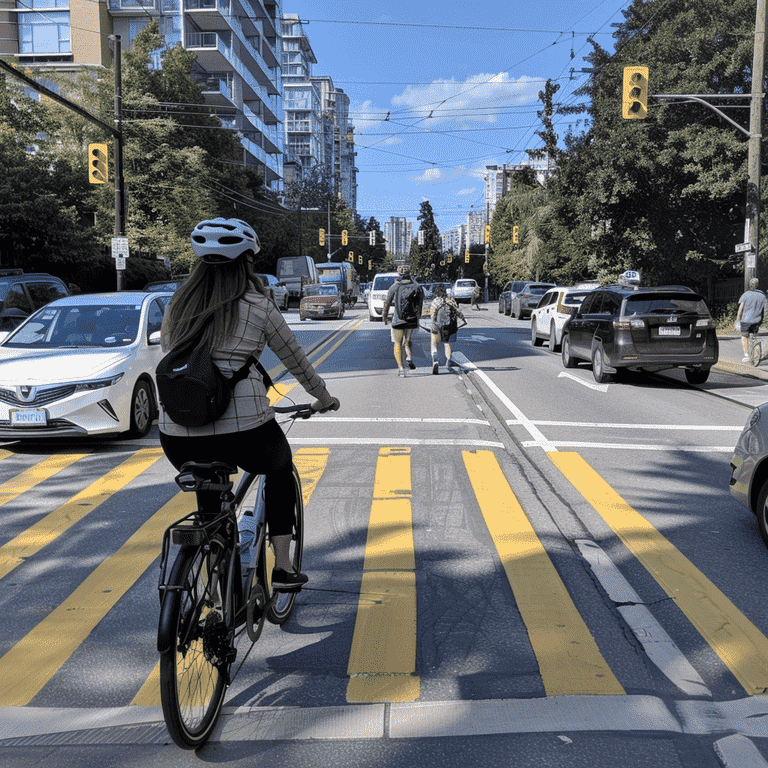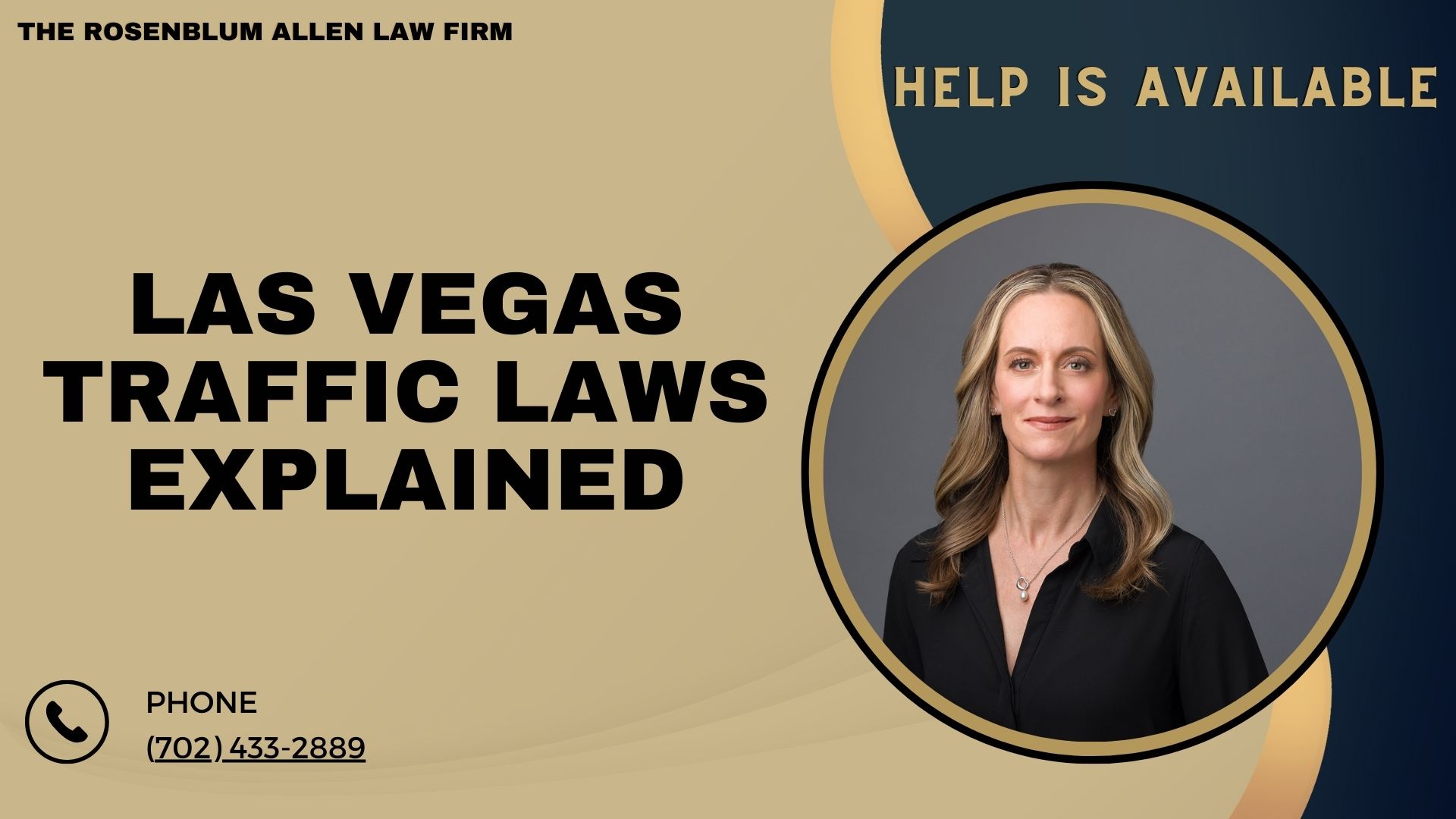Understanding traffic laws is crucial for safe driving. In Las Vegas, traffic regulations are designed to keep everyone on the road safe. This guide explains the critical traffic laws you must know to drive legally and responsibly in Las Vegas.
Note: Make sure to also check out our Failing to Yield to Tow Cars in Las Vegas post while you’re here.
Basic Traffic Rules
Speed Limits
Knowing the speed limits helps prevent accidents and avoid fines. Here’s a breakdown:
- Residential Areas: Typically, the speed limit is 25 mph.
- School Zones: Speed limits can drop to 15 mph during school hours.
- Highways: Speed limits vary but are usually between 55-70 mph.
Right-of-Way Rules
Understanding who has the right of way can prevent collisions.
- Intersections: Yield to vehicles already in the intersection.
- Pedestrian Crosswalks: Always yield to pedestrians in crosswalks.
- Four-Way Stops: The first vehicle to stop should be the first to go. If two cars arrive simultaneously, the driver on the right goes first.
Lane Usage
Proper lane usage ensures smooth traffic flow.
- Passing Lanes: Use the left lane for passing; return to the right lane afterward.
- Carpool Lanes: Reserved for vehicles with two or more occupants during designated hours.
- Turning Lanes: Use designated lanes to make turns. Check for signage indicating turn lanes.

Traffic Signs and Signals
Types of Traffic Signs
Traffic signs guide and regulate traffic flow.
- Regulatory Signs: Indicate laws and regulations (e.g., stop signs, yield signs).
- Warning Signs: Alert drivers to potential hazards (e.g., sharp turn ahead, animal crossing).
- Informational Signs: Provide helpful information (e.g., rest areas, hospital locations).
Traffic Signals
Traffic signals manage the flow of traffic at intersections.
- Red, Yellow, and Green Lights: Red means stop, yellow means prepare to stop, green means go.
- Flashing Lights: Flashing red means stop and proceed when safe; flashing yellow means proceed with caution.
- Pedestrian Signals: Indicate when pedestrians can cross safely. Follow the “Walk” and “Don’t Walk” signs.
Special Driving Conditions
School Zones
Extra caution is required in school zones to protect children.
- Speed Limit Regulations: Reduced speeds, typically 15 mph during school hours.
- Crossing Guards: Follow the directions of crossing guards at all times.
- School Bus Rules: Stop when a school bus has its stop sign extended and lights flashing.
Construction Zones
Construction zones present unique challenges.
- Reduced Speed Limits: Speed limits are often reduced. Obey posted signs.
- Flaggers and Signs: Follow the instructions of flaggers and any posted signs.
- Fines and Penalties: Fines for violations in construction zones can be higher.
Weather Conditions
Weather can impact driving conditions significantly.
- Driving in Rain: Increase following distance, reduce speed, and use headlights.
- Driving in Snow: Use snow tires or chains, drive slowly, and keep a greater distance from other vehicles.
- Dust Storms: If visibility is low, pull over safely and wait for the storm to pass.
DUI Laws
Driving under the influence (DUI) is taken very seriously in Las Vegas. Understanding the rules can help you stay safe and avoid severe penalties.
Legal Blood Alcohol Limits
Different drivers have different legal limits.
- General Population: The legal limit is a blood alcohol concentration (BAC) of 0.08%.
- Commercial Drivers: The limit is stricter at 0.04% BAC.
- Underage Drivers: Zero tolerance for underage drivers with a BAC of 0.02% or higher.
Penalties for DUI
Penalties vary based on the offense.
- First Offense:
- Fines between $400 and $1,000.
- License suspension for 90 days.
- Mandatory DUI school.
- Repeat Offenses:
- Harsher fines and longer license suspensions.
- Mandatory jail time.
- Possible installation of an ignition interlock device.
- Aggravated DUI:
- It occurs when the DUI results in injury or death or if BAC is exceptionally high.
- Harsher penalties include longer jail time and higher fines.
DUI Checkpoints
DUI checkpoints are expected in Las Vegas to catch impaired drivers.
- Locations and Frequency: Often set up during holidays and weekends.
- Rights and Responsibilities:
- You must stop if directed by an officer.
- You have the right to remain silent and request an attorney.
- You must provide your license, registration, and proof of insurance.

Traffic Violations and Penalties
Knowing common traffic violations and their consequences helps you avoid costly mistakes.
Common Traffic Violations
Here are some violations frequently seen in Las Vegas:
- Speeding: Exceeding the posted speed limit.
- Running Red Lights: Need to stop at red traffic signals.
- Illegal Turns: Making turns where prohibited or unsafe.
Fines and Penalties
Penalties for traffic violations can be severe.
- Traffic Tickets: Fines vary based on the violation, typically from $100 to $1,000.
- Court Appearances: Some violations require a court appearance.
- Point System: Points are added to your driving record for each violation. Accumulating too many points can lead to license suspension.
Contesting Traffic Violations
If you believe a ticket was issued unfairly, you can contest it.
- Steps to Dispute a Ticket:
- Review the ticket for errors.
- Gather evidence (photos, witness statements).
- Attend the court hearing.
- Legal Representation: Consider hiring an attorney for serious violations.
- Court Procedures: Be prepared to present your case and any supporting evidence.
Driving without a License or Insurance
Driving without proper documentation can lead to severe consequences.
License Requirements
You must have a valid driver’s license to operate a vehicle.
- Obtaining a Nevada Driver’s License:
- Pass written and driving tests.
- Provide proof of identity, residency, and Social Security number.
- Renewal Process: Renew every four years either online, by mail, or in person.
- Penalties for Driving Without a License: Fines up to $1,000 and potential jail time.
Insurance Requirements
Insurance is mandatory for all drivers.
- Minimum Coverage: Nevada requires liability insurance with at least:
- $25,000 for bodily injury or death of one person.
- $50,000 for bodily injury or death of two or more persons.
- $20,000 for property damage.
- Proof of Insurance: Always keep proof of insurance in your vehicle.
- Penalties for Lack of Insurance: Fines, license suspension, and possible vehicle impoundment.
Accidents and Reporting
Accidents can be stressful. Knowing what to do can help you stay calm and comply with the law.
What to Do After an Accident
Take immediate steps to ensure everyone’s safety.
- Immediate Steps:
- Check for injuries and call 911 if necessary.
- Move vehicles out of traffic if it’s safe to do so.
- Contacting Authorities: Always call the police to report the accident.
- Exchanging Information: Exchange names, addresses, phone numbers, and insurance details with the other driver(s).
Reporting Requirements
Inevitable accidents must be reported to authorities.
- When to Report: Report accidents involving injury, death, or significant property damage.
- How to File a Report: File a report with the Nevada Department of Motor Vehicles (DMV) within ten days if required.
- Insurance Claims: Contact your insurance company promptly to file a claim. Provide all necessary information and documentation.


Pedestrian and Bicycle Laws
Safety for all road users is crucial. Here are the critical rules for pedestrians and cyclists in Las Vegas.
Pedestrian Rights and Responsibilities
Pedestrians have specific rights and duties.
- Crosswalk Use:
- Always use marked crosswalks when available.
- Obey pedestrian signals at intersections.
- Right-of-Way:
- Pedestrians have the right of way in crosswalks.
- Do not suddenly leave the curb if it causes an immediate hazard.
- Sidewalk Use:
- Walk on the sidewalk where available.
- If there is no sidewalk, walk facing traffic on the left side of the road.
Bicycle Regulations
Cyclists have rights and responsibilities to ensure their safety.
- Bike Lanes:
- Use designated bike lanes when available.
- Only ride on sidewalks in business districts if allowed by local ordinances.
- Helmet Laws:
- Nevada does not require helmets for cyclists, but wearing one is strongly recommended for safety.
- Night Riding Requirements:
- Bicycles must have a front white light visible from 500 feet.
- A rear red reflector or light visible from 300 feet is required.
- Bicycles should also have reflective materials on the pedals or the rider’s shoes and ankles.
Changes and Updates to Traffic Laws
Traffic laws can change. Staying informed ensures you follow current regulations.
Recent Changes in Legislation
Keeping up with the latest laws helps avoid unintentional violations.
- New Speed Limits:
- Speed limits in certain areas may change. Check for updated signs.
- Updated Fines:
- Fines for specific violations can increase. Stay aware of the latest penalty structures.
- New Traffic Signs:
- Watch for new or updated traffic signs indicating changes in road use or rules.
Staying Informed
Regularly updating your knowledge keeps you compliant and safe.
- Resources for Updates:
- Nevada Department of Motor Vehicles (DMV) website.
- Local news and traffic reports.
- Traffic law update seminars and workshops.
- Public Information Campaigns:
- Follow campaigns aimed at raising awareness about traffic law changes.
- Participate in community discussions and forums.
- Community Involvement:
- Engage with local traffic safety groups.
- Attend city council meetings where traffic laws are discussed.

Breaking It All Down
Understanding and following Las Vegas traffic laws is essential for your safety and the safety of others. By staying informed and compliant, you contribute to a safer driving environment. Remember, safe driving is everyone’s responsibility. Stay updated, follow the rules, and drive responsibly.
For more detailed information, always refer to the official Nevada DMV resources or consult a legal professional with specific concerns or questions. Safe travels!

Frequently Asked Questions
What should I do if I get a traffic ticket in Las Vegas?
If you receive a traffic ticket, carefully read the instructions on the ticket. You can either pay the fine or contest the ticket in court. To dispute it, gather evidence, and consider legal representation.
How can I check the status of my driver's license?
You can check the status of your driver’s license by visiting the Nevada DMV website or contacting them directly. You may need to provide your driver’s license number and other personal information.
Are there specific rules for turning at intersections in Las Vegas?
Yes, always signal your turns and use designated turning lanes when available. Yield to oncoming traffic and pedestrians when making a left turn.
What are the consequences of accumulating too many points on my driving record?
Accumulating too many points can lead to the suspension of your driver’s license. Each traffic violation adds points to your record, and your license may be suspended if you reach a certain number within a set period.
Do I need to report a minor accident if there are no injuries?
You should report any accident involving injury, death, or significant property damage. Even minor accidents should be reported to your insurance company promptly.
What is the procedure for renewing my driver's license in Nevada?
You can renew your driver’s license online, by mail, or in person. Ensure you have all necessary documents, such as proof of identity and residency. Check the Nevada DMV website for specific renewal requirements.
Are there special rules for driving in construction zones?
Yes, you must obey reduced speed limits and follow instructions from flaggers and posted signs. Fines for violations in construction zones are typically higher.
What equipment is required for bicycles at night?
Bicycles must have a front white light visible from 500 feet and a rear red reflector or light visible from 300 feet. Reflective materials on the pedals or the rider’s shoes and ankles are also required.
Can I use my phone while driving in Las Vegas?
Using a handheld phone while driving is illegal. Use a hands-free device or pull over safely to make a call or send a text.
What happens if I drive without car insurance?
Driving without car insurance can result in fines, license suspension, and possible vehicle impoundment. You must have at least the minimum required liability coverage.
Where can I find updates on traffic laws in Las Vegas?
Updates on traffic laws can be found on the Nevada DMV website, local news outlets, and public information campaigns. Stay engaged with community traffic safety groups and attend relevant city council meetings.
Is it mandatory to stop for a school bus in Las Vegas?
Yes, it would be best to stop when a school bus has its stop sign extended and lights flashing, regardless of the direction you are traveling, unless you are on the opposite side of a divided highway.
How do I obtain a Nevada driver's license?
To obtain a Nevada driver’s license, you must pass written and driving tests, provide proof of identity, residency, and Social Security number, and complete any required paperwork at the DMV.
What should I do if I encounter a DUI checkpoint?
If you encounter a DUI checkpoint, you must stop if an officer directs. Provide your license, registration, and proof of insurance. You have the right to remain silent and request an attorney if needed.
Are there any special rules for driving in bad weather in Las Vegas?
Yes, in bad weather like rain or snow, reduce your speed, increase following distance, and use headlights. In dust storms, pull over safely and wait until visibility improves.

Additional Resources for You from The Rosenblum Allen Law Firm.
Our lead attorney, Molly Rosenblum Allen, Esq, has created several other resources to assist you in your time of need. These resources cover a range of legal topics and can provide valuable information for various situations you may encounter:
- Double Jeopardy: Understand the concept of double jeopardy and its implications in legal proceedings.
- Hung Jury: Learn what happens when a jury cannot reach a unanimous decision and how it affects your case.
- Circumstantial Evidence: Explore the role of circumstantial evidence in criminal cases and its impact on verdicts.
- Indicted vs Charged: Discover the differences between being indicted and being charged, and what each means for your legal situation.
- Difference Between Jail and Prison: Clarify the distinctions between jail and prison, including their respective purposes and conditions.
- What are Miranda Rights: Understand your Miranda Rights and their importance during police interrogations.
- How to Check if You Have an Outstanding Warrant: Find out how to check if there is an outstanding warrant against you and what steps to take if there is.
- What to Look for in a Criminal Defense Lawyer: Learn what qualities and qualifications to look for when hiring a criminal defense lawyer.
- Possible Ways to Reduce a Felony Charge: Explore strategies that might help in reducing a felony charge to a lesser offense.
- Should You Accept a Plea Bargain: Weigh the pros and cons of accepting a plea bargain in your case.

Offsite Resources for You
Nevada DMV: Comprehensive information on driver’s licenses, vehicle registration, and traffic laws in Nevada.
National Highway Traffic Safety Administration (NHTSA): Offers resources on traffic safety, vehicle recalls, and crash data.
AAA Foundation for Traffic Safety: Provides research and education on road safety, including tips for safe driving.
American Bar Association: A wide range of legal resources, including information on traffic laws and DUI regulations.
Mothers Against Drunk Driving (MADD): Advocacy and resources for preventing drunk driving and supporting victims.
Insurance Institute for Highway Safety (IIHS): Research and information on vehicle safety and road safety improvements.
Las Vegas Metropolitan Police Department (LVMPD): Local law enforcement information, including traffic law enforcement and safety tips.

A Special Message from Our Lead Attorney, Molly Rosenblum Allen, Esq

Dear Reader,
Thank you for taking the time to explore our resources. I hope you found the information helpful and insightful. Please don’t hesitate to reach out if you have any further questions or need assistance with your legal situation. My team and I at The Rosenblum Allen Law Firm are here to support you.
Give us a call at (702) 433-2889 to get the ball rolling. We look forward to helping you navigate through this process.
Best regards,
Molly Rosenblum Allen, Esq







